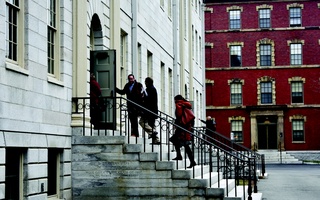{shortcode-2e08447518d32be600da1a285b9956fab4c951fc}
Five sophomores declared Environmental Science and Engineering — Harvard’s newest concentration — this year, according to Patrick D. Ulrich, the program’s associate director for undergraduate studies.
Approved in the spring, the newest offering became the College’s 50th field of concentration. Previously, students interested in the field received a bachelor of arts or a bachelor of science in the Engineering Sciences concentration on a special track.
The change maintains the bachelor of science option, known as an S.B. at Harvard, in Engineering Sciences and replaces the bachelor of arts option in Engineering Sciences with an A.B. solely in the new Environmental Science and Engineering concentration.
Seven sophomores declared the older S.B. in Engineering Sciences this fall, in addition to the five who went with the new A.B. in Environmental Science and Engineering, according to Ulrich.
Ulrich said that making Environmental Science and Engineering its own concentration gives the field more visibility; there were few substantive changes to the curriculum.
“We were sort of buried in Engineering Sciences. Freshmen would come in and have to look really hard to find us,” Ulrich said. “We wanted to make sure that students know that we offer this awesome program in Environmental Science and Engineering. This puts it on equal footing with all of the other concentrations.”
Marissa Saenger ’18–’19, who switched into the new A.B. program this year, said the change makes it easier to find the environment-focused field among all of the Engineering Sciences options.
“Before it was kind of hidden among Engineering Sciences and all the possible tracks and now it’s just standing on its own,” Saenger said.
Tatiana S. Jimenez ’21, who recently declared an A.B. in the new field, said the change affected her perception of what was possible in the concentration.
“I knew I didn’t want to become an engineer in the future,” Jimenez said. “There’s probably a good chance I wouldn’t have declared Engineering Sciences with a track in ESE. If it had never changed, I don’t think I would’ve gone down that route.”
In addition to the recently declared sophomores, several upperclassmen switched from Engineering Sciences on the specialized track to the new concentration.
“Most of our seniors decided they were going to stay in Engineering Sciences track and finish what they’ve been doing all along and most of our juniors have decided to make the switch,” Ulrich said.
Julia Henry ’20, who switched to the A.B. in Environmental Science and Engineering, said that she appreciated “flexibility” in the new program — some previously required classes like the College’s introduction to Computer Science course are no longer part of the mandatory curriculum, she said.
Beverly Ge ’20, another junior who opted for the new A.B., said she couldn’t see “any downside” to switching to the Environmental Science and Engineering concentration.
“My friends and I, we were definitely very excited when the news came out,” said Ge, who described the program as “very accommodating” for those transitioning to the new concentration. “I don’t see myself becoming a technical engineer so doing an A.B. made more sense.”
— Staff writer Cindy H. Zhang can be reached at cindy.zhang@thecrimson.com.
Read more in News
Midyear Graduates Ceremony Recognizes 118 SeniorsRecommended Articles
-
Rules Require RegistrationThe Christmas recess for students registered in the Graduate School of Arts and Sciences, in Harvard College, or in the
-
ENGINEERING FIELD ADDS NEW COURSES FOR YEAR 1932-33The forthcoming announcement of courses given under the Faculty of Arts and Sciences will show in the Department of Engineering
-
Largest War Changes In Physical SciencesThis is the third in a series of articles to appear during the coming weeks discussing the effects of the
-
 Faculty to Vote on New Environmental Engineering Concentration
Faculty to Vote on New Environmental Engineering Concentration -
 The Destitution of Liberal Arts at Harvard
The Destitution of Liberal Arts at Harvard













